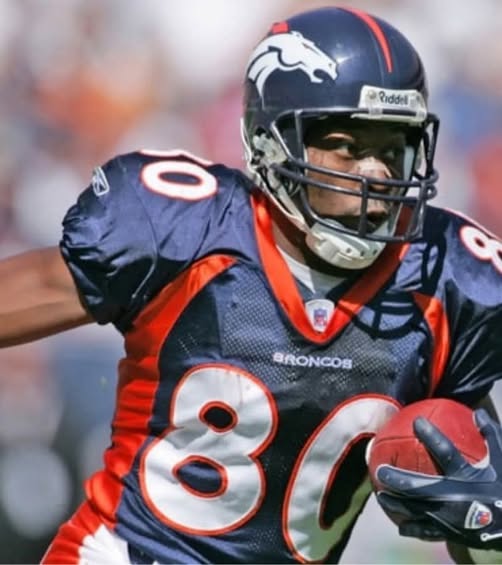In the annals of NFL history, few stories are as inspiring as that of Rod Smith, the undrafted wide receiver who defied the odds to become one of the most productive and respected players in Denver Broncos history. Over a 12-year career spent entirely with the Broncos, Smith established himself as a model of consistency, toughness, and clutch performance. A three-time Pro Bowler, two-time All-Pro, and two-time Super Bowl champion, Smith’s legacy is defined not just by his accolades but by his relentless work ethic and leadership. His eight seasons with at least 1,000 receiving yards stand as a testament to his dominance during an era when the Broncos were one of the NFL’s most formidable teams.
Humble Beginnings and the Road to Denver
Rodney Smith was born on May 15, 1970, in Little Rock, Arkansas. Despite a standout collegiate career at Missouri Southern State University—a Division II school—Smith went overlooked in the 1994 NFL Draft. At the time, small-school prospects faced an uphill battle to even make an NFL roster, let alone become stars. But Smith’s determination was unmatched. He signed with the Denver Broncos as an undrafted free agent, beginning a journey that would see him rise from special teams contributor to one of the most reliable receivers in the league.
Smith’s early years in Denver were spent learning behind established stars like Shannon Sharpe and Ed McCaffrey. He made his first significant impact in 1995, catching six passes for 103 yards in a playoff game against the Buffalo Bills. Though the Broncos lost, Smith’s performance was a glimpse of what was to come.
Breakout and Super Bowl Glory
The 1997 season marked Smith’s true arrival as a star. That year, he became John Elway’s most trusted target, finishing with 1,180 receiving yards and 12 touchdowns. His most iconic moment came in Week 1 against the rival Kansas City Chiefs, when he caught an 80-yard touchdown pass in overtime to win the game—a play that remains one of the greatest in Broncos history.
That season culminated in Denver’s first Super Bowl victory, with Smith playing a key role in the team’s playoff run. He followed it up with another strong year in 1998, helping the Broncos secure back-to-back championships. Though Sharpe and McCaffrey received much of the attention, Smith’s ability to make big plays in crucial moments solidified his place as a cornerstone of the offense.
Dominance in the Post-Elway Era
When John Elway retired after the 1998 season, many assumed the Broncos would decline. Instead, Smith elevated his game, proving he was far more than just a product of a Hall of Fame quarterback. With Brian Griese and later Jake Plummer under center, Smith continued to produce at an elite level. From 2000 to 2002, he recorded three consecutive 1,000-yard seasons, earning Pro Bowl honors in 2000 and 2001.
His 2001 campaign was particularly remarkable. At 31 years old, Smith hauled in 113 receptions for 1,343 yards and 11 touchdowns, earning First-Team All-Pro recognition. His chemistry with Plummer in the mid-2000s kept Denver competitive, and in 2005, at age 35, Smith posted his eighth and final 1,000-yard season, proving that his longevity was as impressive as his peak performance.
Leadership and Legacy
Beyond statistics, Smith was revered for his leadership. He was a mentor to younger players, including future star Brandon Marshall, and was known for his relentless preparation. Coaches and teammates often spoke of his film study habits, route-running precision, and willingness to block in the running game—a trait not always associated with star receivers.
Smith’s toughness was also legendary. He played through numerous injuries, including a hip issue that ultimately ended his career in 2007. Even in his final seasons, he remained a dependable target and a respected voice in the locker room.
Records and Accolades
When Smith retired, he held nearly every major receiving record in Broncos history. He remains the franchise leader in receptions (849), receiving yards (11,389), and receiving touchdowns (68). At the time of his retirement, he was the all-time leading undrafted receiver in NFL history—a record that stood until Wes Welker surpassed him.
Despite his incredible production, Smith has yet to be inducted into the Pro Football Hall of Fame—an omission many consider a glaring oversight. While he may not have had the flashiest persona or played in a major media market, his consistency, championship pedigree, and impact on the Broncos’ success make a strong case for eventual enshrinement.
Life After Football
Since retiring, Smith has remained connected to the Broncos organization and the Denver community. He has worked in various roles, including as a radio analyst and a mentor to current players. His charitable efforts, particularly in supporting underprivileged youth, reflect the same dedication he showed on the field.



